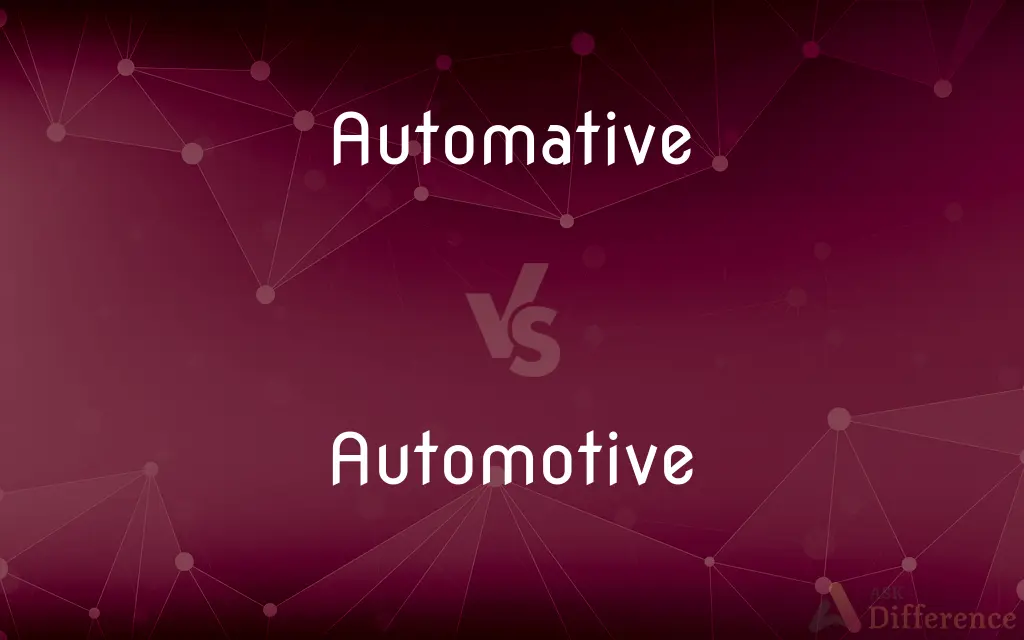Automative vs. Automotive — What's the Difference?
Automative technology focuses on the process of automation, streamlining operations without human intervention, whereas automotive refers to everything related to automobiles, from design to manufacture.

Difference Between Automative and Automotive
Table of Contents
ADVERTISEMENT
Key Differences
Automative technology is designed to create systems and machines that operate automatically, enhancing efficiency and safety in various sectors. This includes robotics, manufacturing systems, and smart technology. On the other hand, the automotive industry is concerned with vehicles, including their design, development, manufacturing, marketing, and sales. It encompasses a wide range of vehicles such as cars, trucks, and motorcycles.
While automative advancements aim to reduce human error and increase production speed through automation, the automotive sector focuses on improving vehicle performance, safety, and sustainability. Innovations in automotive technology are often geared towards enhancing the driving experience and reducing environmental impact.
Automative solutions can be applied in numerous fields beyond automotive, including agriculture, healthcare, and home automation, demonstrating its versatility. Conversely, automotive technologies are specialized for use in vehicle systems, such as propulsion, navigation, and diagnostics.
The development of automative technology often involves artificial intelligence and machine learning to make systems smarter and more adaptive. Meanwhile, automotive engineering incorporates various disciplines such as mechanical, electrical, and materials science to innovate and improve vehicle design and function.
Investments in automative technologies are driven by the need to increase efficiency, reduce costs, and improve safety in industrial and consumer applications. In contrast, investments in the automotive industry are motivated by consumer demand, regulatory requirements for safety and emissions, and the ongoing shift towards electric and autonomous vehicles.
ADVERTISEMENT
Comparison Chart
Focus
Automation processes and systems
Automobiles and related activities
Industries Served
Broad (manufacturing, healthcare, etc.)
Primarily vehicle manufacturing and services
Key Technologies
Robotics, AI, machine learning
Vehicle engineering, electronics
Goal
Increase efficiency, reduce human intervention
Improve vehicle performance, safety
Application Examples
Automated assembly lines, smart homes
Electric cars, autonomous driving technology
Compare with Definitions
Automative
Related to the development of autonomous systems.
Automative innovations have led to the creation of self-operating machines.
Automotive
Relating to motor vehicles.
Automotive engineers work to improve engine efficiency.
Automative
Involving the use of robots to perform tasks.
The warehouse implemented an automative solution for sorting packages.
Automotive
Pertaining to the automotive industry.
He has worked in automotive sales for over a decade.
Automative
Associated with smart technology in homes and businesses.
Automative lighting systems can adjust based on the time of day.
Automotive
Concerned with vehicle maintenance and repair.
The automotive technician diagnosed the problem as a faulty alternator.
Automative
Refers to the automation of processes and operations.
Automative software has streamlined the data entry process.
Automotive
Involving the design and manufacture of cars.
The latest automotive trends were showcased at the auto show.
Automative
Pertaining to the technology of automation.
The automative system reduced the need for manual labor in the factory.
Automotive
Related to automotive technology and innovation.
Automotive startups are exploring the potential of electric vehicles.
Automative
The automatic operation or control of equipment, a process, or a system.
Automotive
Moving by itself; self-propelling or self-propelled.
Automative
The techniques and equipment used to achieve automatic operation or control.
Automotive
Of or relating to self-propelled vehicles.
Automative
The condition of being automatically controlled or operated.
Automotive
Having the ability to move by itself; self-propelled or self-propelling.
Automative
Relating to automation.
Automotive
Of, or relating to motor vehicles.
Automotive
A shop or company that sells motor vehicle parts
Automotive
Of or pertaining to the automobile.
Automotive
Containing within itself the means of propulsion or movement.
Automotive
Of or relating to motor vehicles;
Automotive supplies
Automotive
Containing within itself the means of propulsion or movement;
A self-propelled vehicle
Common Curiosities
Can automative technology be applied in other industries?
Yes, automative technology is versatile and can be applied in various industries beyond automotive, including manufacturing, agriculture, and healthcare.
What are the main goals of automotive engineering?
The main goals of automotive engineering are to improve vehicle performance, enhance safety, and meet regulatory standards.
How do automative and automotive technologies intersect?
Automative and automotive technologies intersect in areas such as autonomous driving and smart manufacturing processes, where automation plays a key role in advancing vehicle technologies.
What innovations are driving the automotive industry today?
Innovations driving the automotive industry include electric vehicles, autonomous driving technology, and connected car features.
What is the future of automative technology?
The future of automative technology is geared towards more intelligent, adaptive systems that can learn and make decisions, enhancing efficiency across various sectors.
What is automative technology?
Automative technology refers to the use of automated systems and machinery to perform tasks without human intervention.
Are automative technologies only related to robotics?
While robotics is a significant aspect of automative technologies, it also encompasses AI, machine learning, and other systems aimed at automating tasks.
How does automation impact the automotive manufacturing process?
Automation improves the automotive manufacturing process by increasing production speed, improving precision, and reducing human error.
How does the automotive industry use automative technologies?
The automotive industry uses automative technologies in manufacturing processes, such as automated assembly lines and robotics, to increase efficiency and reduce costs.
How are automotive companies responding to environmental concerns?
Automotive companies are responding to environmental concerns by investing in electric vehicles, improving fuel efficiency, and reducing emissions.
What are the key differences between automative and automotive?
The key differences lie in their focus: automative is about automation and efficiency across various industries, while automotive specifically relates to vehicles and their associated technologies and industries.
What role does AI play in automative technology?
AI plays a crucial role in automative technology by enabling systems to learn from data, make decisions, and improve operations autonomously.
What challenges do automotive engineers face today?
Automotive engineers face challenges such as designing for electric and autonomous vehicles, meeting stringent emissions standards, and integrating advanced technologies.
Can automative technologies improve safety in vehicles?
Yes, automative technologies like advanced driver-assistance systems (ADAS) and autonomous driving features can significantly improve safety in vehicles.
How does automative technology benefit the consumer sector?
Automative technology benefits the consumer sector by enhancing the functionality and convenience of products and services, from smart home devices to automated customer support.
Share Your Discovery

Previous Comparison
Hanky vs. Handkerchief
Next Comparison
Draftsman vs. Draughtsman














































